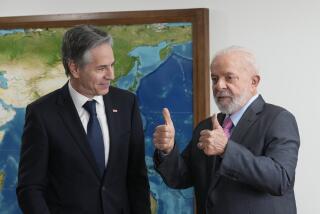Cuba’s surrogates
- Share via
Today, Fidel Castro will fire another round in his battle with the United States that began 47 years ago when the Kennedy administration imposed an economic embargo on Cuba. Castro may be on his deathbed, but he has surrogates.
In this case, it will be Brazilian President Luiz Inacio Lula da Silva. When Lula arrives at the White House today, he is expected to tell President Obama that the U.S. embargo of Cuba is anachronistic, vindictive and counterproductive, and to suggest a change of course.
Lula will not be speaking formally for all of Latin America, but he is undoubtedly its de facto negotiator, a leader whose role reflects Brazil’s outsized influence in the region.
Bolivian President Evo Morales has asked him to beg Obama to restore trade preferences that granted duty-free access to Bolivian textiles. Venezuela’s combative anti-American president, Hugo Chavez, also has sought Lula’s help, reportedly to reduce the “noise” level in the relationship between the U.S. and Venezuela. (Ironically, Chavez seems unaware that he remains the undisputed biggest noise polluter in the hemisphere.)
Cuba is high on Lula’s agenda, and he is not alone in his devotion to Castro. He has often spoken of the seminal role the Cuban revolution played for his generation. “The example of the Cuban revolution was our inspiration in the terrible times of repression and during the construction of a better nation,” he said.
Since the beginning of the year, eight left-leaning Latin American presidents have taken turns visiting Havana in hopes of getting a brief -- and most likely final -- one-on-one with their idol. So far, only four of them -- Cristina Fernandez de Kirchner of Argentina, Michelle Bachelet of Chile, Leonel Fernandez of the Dominican Republic and Chavez -- have won the main prize and met with the old tyrant. The unlucky four (leaders from Ecuador, Guatemala, Panama and Honduras) had to settle for Raul Castro, the despot’s younger brother who won the Cuban presidency a year ago by one vote: Fidel’s.
The pilgrimage to the left’s mecca in the Western Hemisphere is part of a concerted effort to send Obama a message telling him to stop treating Cuba as a pariah state. In December, a summit of 33 Caribbean and Latin American nations agreed that, in Raul Castro’s words, the U.S. should “cease this illegal and unjust violation of the human rights” of Cubans.
They may have a point. The consensus, even among conservative business groups in the U.S., is that the embargo has failed miserably. If its purpose was to overthrow Castro, it didn’t work. The Castro brothers still rule the island with an iron fist. The embargo has only punished the impoverished Cuban people. Some even suggest that it has emboldened the Castro regime and allowed the comandante and his cronies to place blame for the crumbling of Cuban society on the U.S.
Yet it is disheartening, to say the least, that neither Lula nor any of the other Latin American leaders who so vigorously demand change in U.S. policy have dared to ask the Castro brothers the same. They are silent on the issues of democracy, freedom of the press and respect for human rights in Cuba. Now, the Latin leadership is even calling for Cuba’s reinstatement to full membership in the Organization of American States, despite the fact that Cuba’s lack of democracy contradicts the OAS charter and its mission.
This is where Obama should hold the line. The U.S. contributes about 60% of the OAS budget. It should continue to support the organization and, with it, the rule of law, human rights and press freedoms in the hemisphere -- all of which means that the U.S. must stand firm against full membership for an unrehabilitated Cuba.
Obama already has taken steps to liberalize U.S.-Cuban relations. He has pushed for legislation that would allow Americans to visit immediate family in Cuba annually, instead of once every three years. He broadened the definition of “immediate family” and dropped a requirement that Havana pay cash in advance for U.S. food imports.
Now Lula and the rest of the Latin American Cuban lobby must tell the Castro brothers that it’s their turn to start steering Cuba in the right direction.
Sergio Muñoz is a contributing editor to Opinion and contributor to “Latinos and the Nation’s Future,” edited by Henry G. Cisneros.
More to Read
Sign up for Essential California
The most important California stories and recommendations in your inbox every morning.
You may occasionally receive promotional content from the Los Angeles Times.










